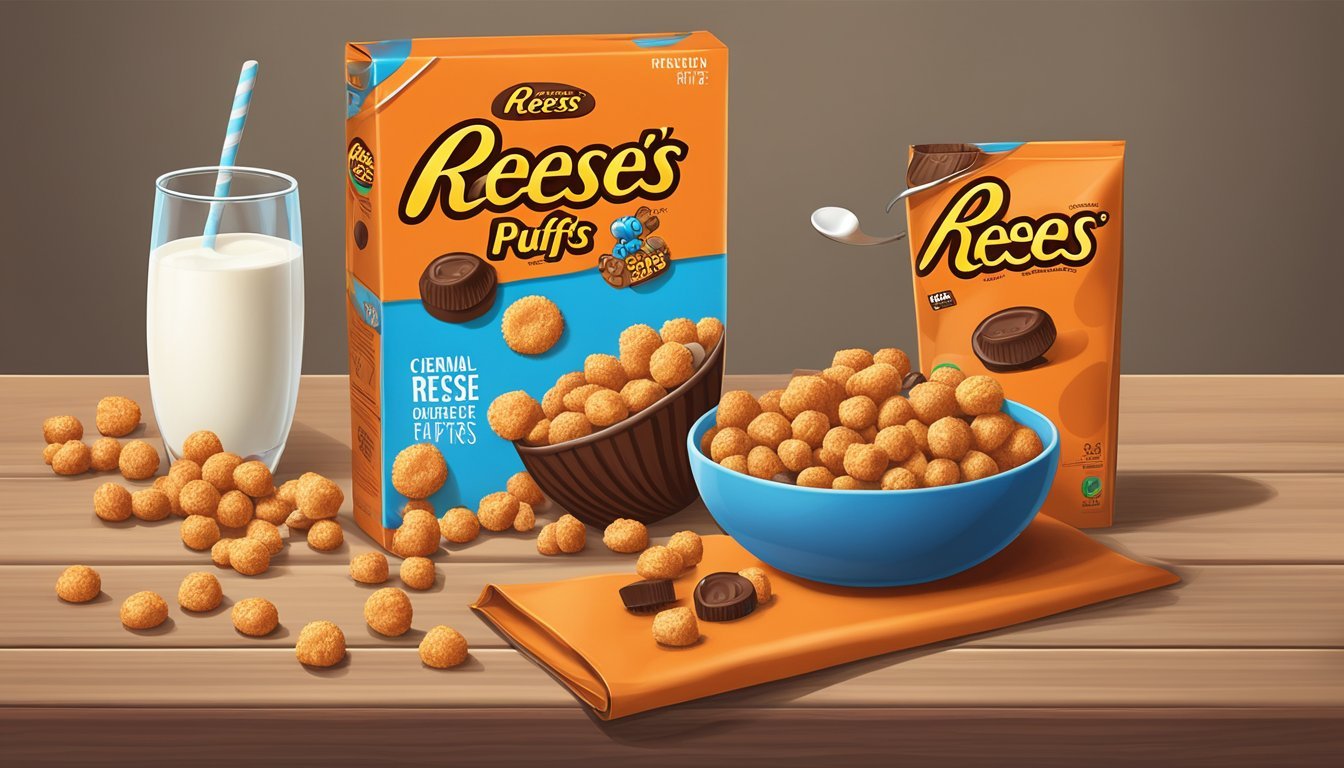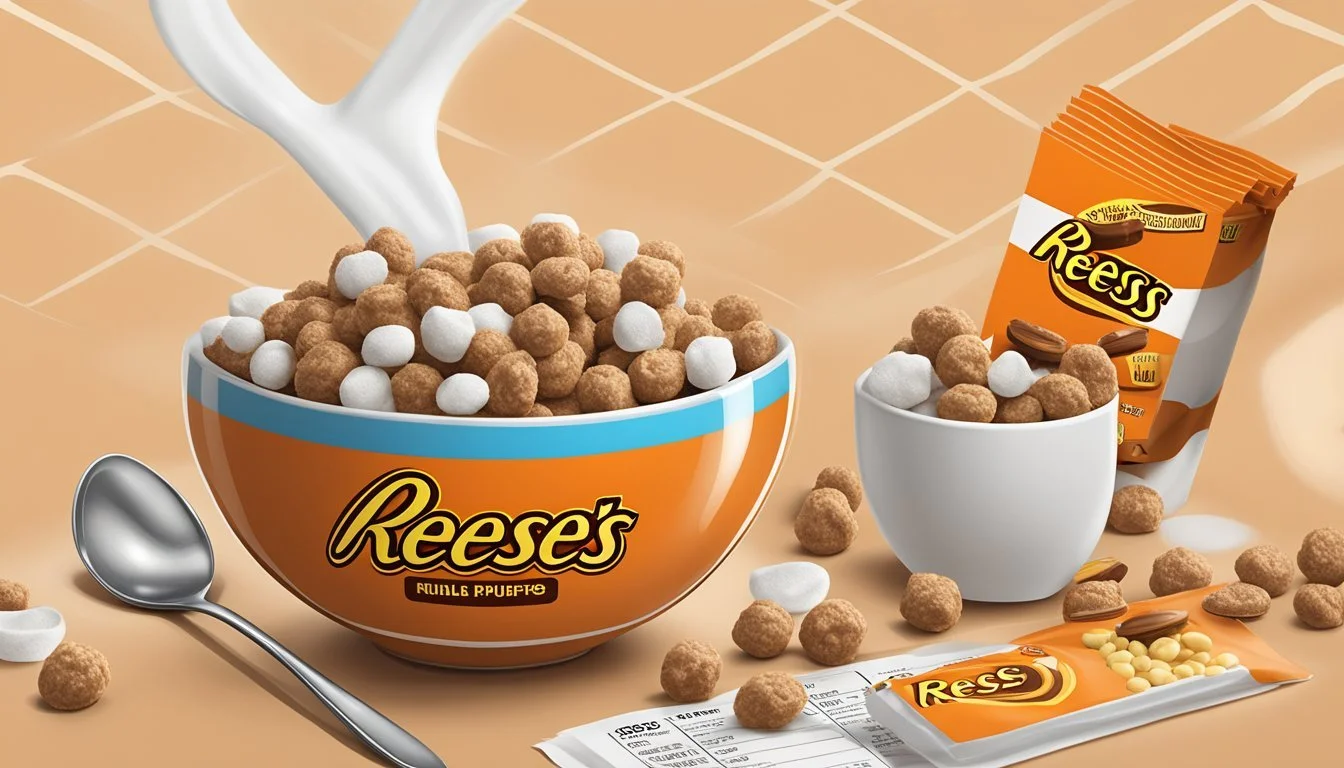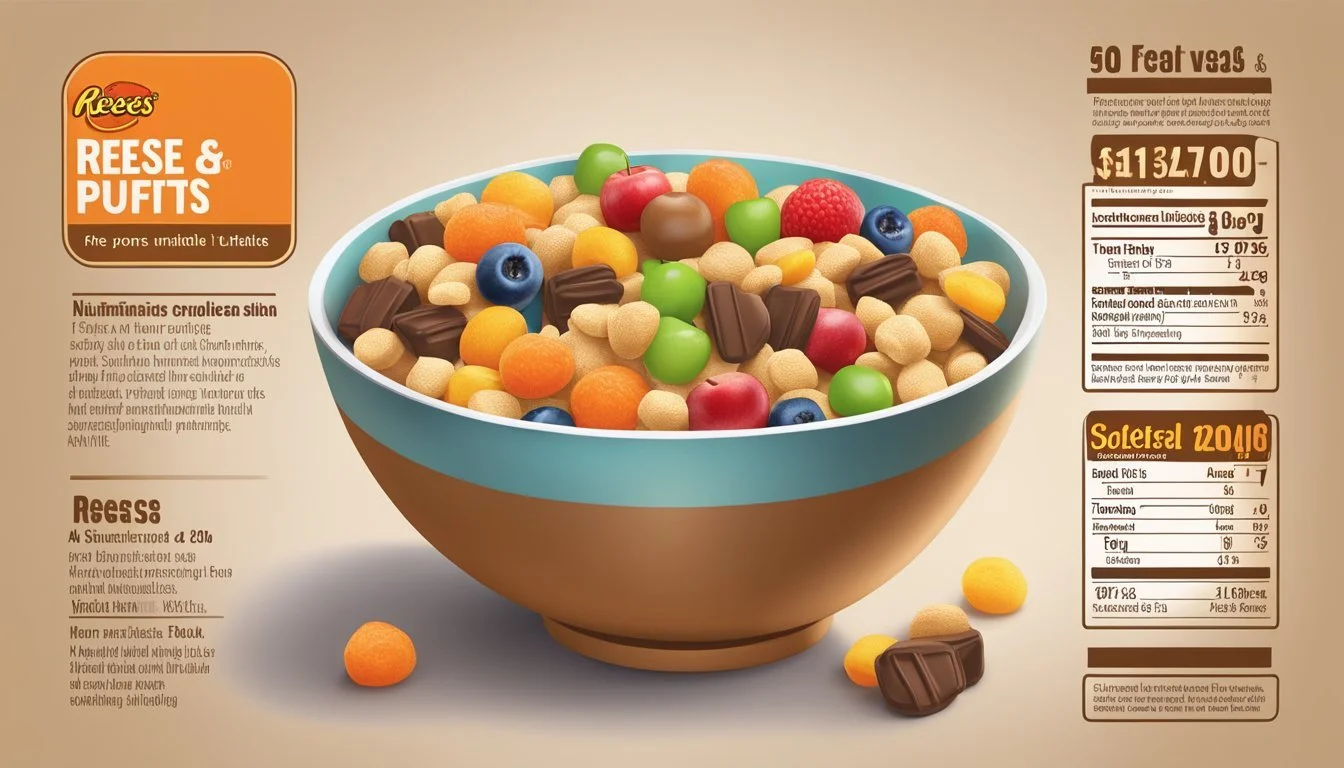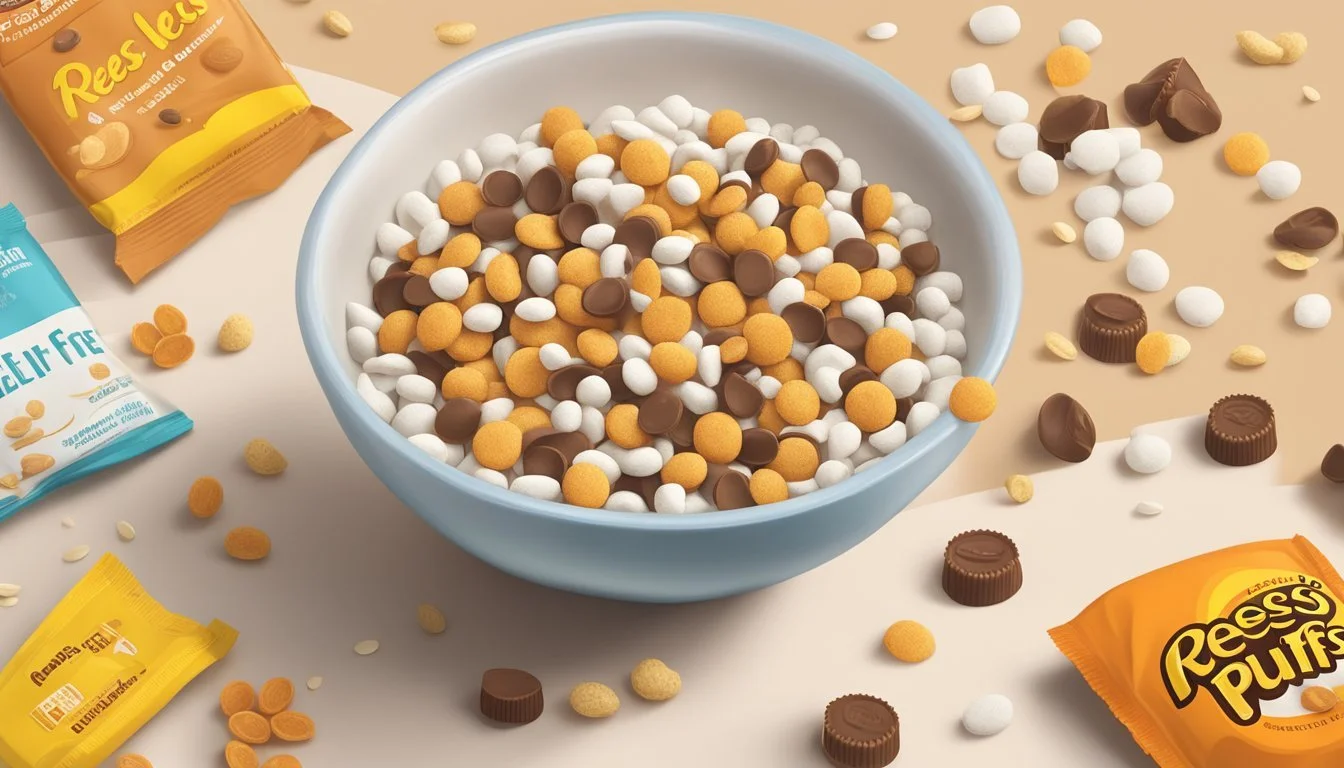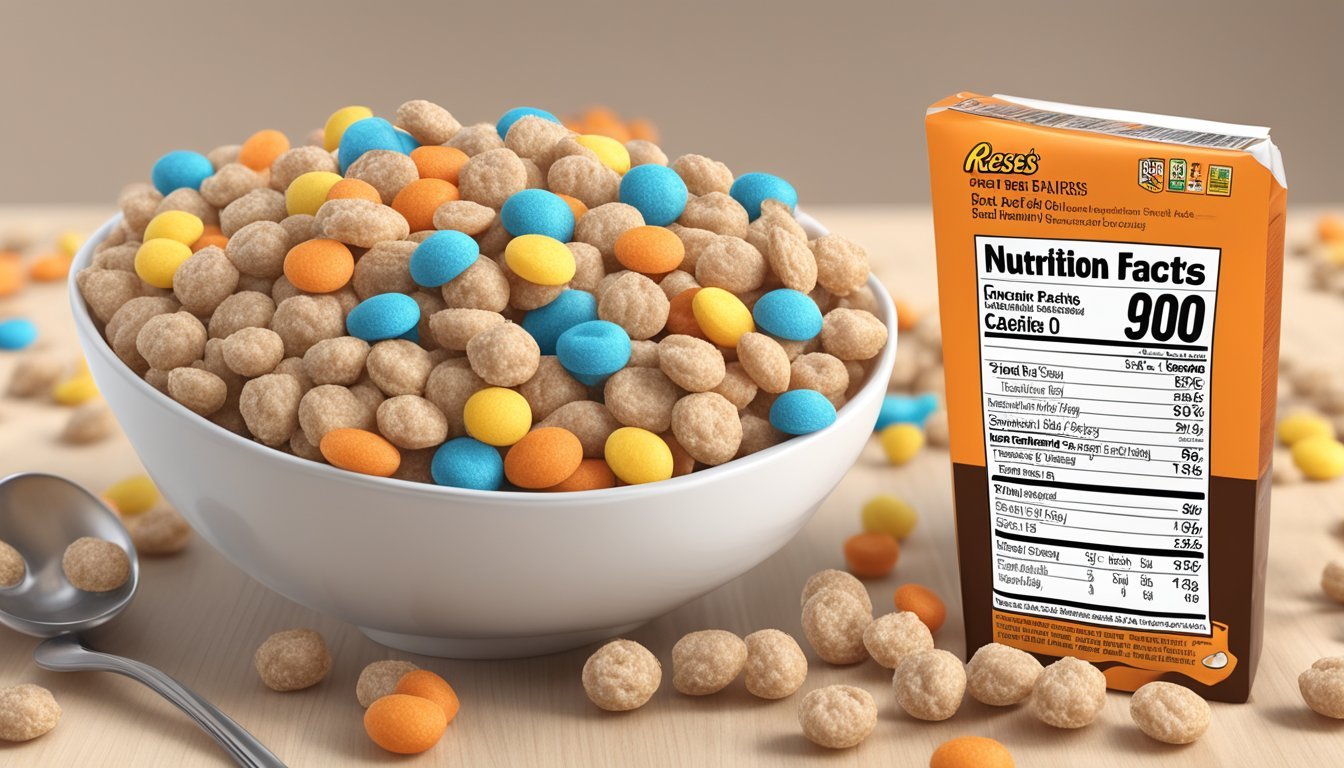Reese's Puffs Nutrition Facts & More
Key Facts About This Popular Cereal
Reese's Puffs, a popular breakfast cereal from General Mills, combines the flavors of Reese's Peanut Butter Cups with crunchy corn puffs. This sweet morning treat has captivated taste buds across America, but many wonder about its nutritional value.
One serving (1 cup or 39 grams) of Reese's Puffs contains 160 calories, 4.5 grams of fat, and 12 grams of sugar. The cereal is made with whole grain corn as its first ingredient, providing some fiber to the mix. It also contains added vitamins and minerals like iron, calcium, and vitamin D, which contribute to its nutritional profile.
While Reese's Puffs offers a tasty way to start the day, consumers should be mindful of portion sizes due to its sugar content. The cereal's blend of chocolate and peanut butter flavors makes it an enticing option for those seeking a dessert-like breakfast experience, but balancing it with other nutrient-dense foods can help create a more well-rounded meal.
Nutrition Facts Overview
Reese's Puffs cereal packs a significant caloric punch and contains a mix of macronutrients dominated by carbohydrates. The cereal's nutritional profile includes notable amounts of sugar and fat, reflecting its candy-inspired flavors.
Caloric Content
A single serving of Reese's Puffs (3/4 cup or 29 grams) contains 120 calories. This amount represents about 6% of a 2,000-calorie daily diet. For those consuming larger portions, a full cup (39 grams) provides 160 calories.
The calorie density of Reese's Puffs becomes more apparent when considering larger quantities. A 100-gram serving contains approximately 500 calories, making it a calorie-rich breakfast option.
Macronutrient Breakdown
Reese's Puffs' macronutrient profile is primarily carbohydrate-based. A one-cup serving (39 grams) contains:
Carbohydrates: 30g (70% of calories)
Fat: 4.5g (23% of calories)
Protein: 3g (7% of calories)
This breakdown shows a high carbohydrate content, moderate fat, and relatively low protein. The cereal's first ingredient is whole grain corn, contributing to its carbohydrate content and providing some dietary fiber.
Sugars and Related Carbohydrates
Sugar plays a significant role in Reese's Puffs' flavor profile and nutritional makeup. The exact sugar content varies slightly between sources, but it's generally high for a breakfast cereal.
The ingredients list reveals multiple sugar sources:
Sugar
Dextrose
Corn syrup
These added sugars contribute to the cereal's sweet taste and calorie content. The presence of whole grain corn also adds some complex carbohydrates and fiber to the mix.
Fats Profile
While not the dominant macronutrient, fats in Reese's Puffs contribute to its flavor and texture. The 4.5 grams of fat per cup serving come from various sources:
Peanut oil (from Reese's peanut butter)
Canola oil
The fat content includes a mix of saturated, monounsaturated, and polyunsaturated fats. The exact breakdown of these fat types is not provided in the available nutrition information.
Peanut oil, a component of the Reese's peanut butter used in the cereal, contains both monounsaturated and polyunsaturated fats. These fats are generally considered more heart-healthy than saturated fats.
Vitamins and Minerals Content
Reese's Puffs cereal contains a variety of essential vitamins and minerals that contribute to overall nutrition. The fortification process adds key nutrients to enhance the cereal's nutritional profile.
Essential Vitamins
Reese's Puffs is fortified with several important vitamins. Vitamin C (sodium ascorbate) supports immune function and acts as an antioxidant. The cereal contains B vitamins, including niacin, riboflavin, and thiamine, which play crucial roles in energy metabolism.
Vitamin D is added to support bone health and calcium absorption. Vitamin A contributes to eye health and immune function. Vitamin E (mixed tocopherols) serves as an antioxidant and helps preserve the cereal's freshness.
Minerals
The mineral content of Reese's Puffs includes several essential elements. Calcium and iron are key minerals present in significant amounts. Calcium supports bone and tooth health, while iron is crucial for oxygen transport in the blood.
Zinc is another mineral nutrient added to the cereal. It plays a role in immune function and wound healing. Phosphorus, in the form of tricalcium phosphate, contributes to bone health and energy metabolism.
Beneficial Plant Compounds
While not technically vitamins or minerals, Reese's Puffs contains some beneficial plant compounds. Cocoa, used for flavoring, provides antioxidants like flavonoids. These compounds may have positive effects on heart health.
Peanuts, a key ingredient in the cereal, contain resveratrol, a plant compound with potential anti-inflammatory properties. The cereal also includes natural and artificial flavors, which may contain trace amounts of other plant-derived compounds.
Special Dietary Considerations
Reese's Puffs cereal presents unique considerations for those with specific dietary needs or preferences. Its ingredients and nutritional profile impact its suitability for various eating plans and restrictions.
Gluten-Free and Allergens
Reese's Puffs contain whole grain corn as a primary ingredient, making them gluten-free. This cereal is suitable for individuals with celiac disease or gluten sensitivity.
However, the product contains peanuts, a major allergen. Those with peanut allergies should avoid Reese's Puffs entirely.
The cereal may also be processed in facilities that handle other common allergens like tree nuts, milk, and soy. Cross-contamination risks exist for individuals with severe allergies to these ingredients.
Vegetarian and Vegan Profiles
Reese's Puffs are vegetarian-friendly, containing no meat products. The cereal uses plant-based ingredients for its core components.
Vegans should exercise caution. While the main ingredients are plant-derived, some vitamins and minerals added for fortification may be of animal origin. The vitamin D used in fortification could come from lanolin, a sheep's wool derivative.
Strict vegans may want to contact the manufacturer for more detailed information about the sources of these added nutrients.
Low-Carb and Keto Diets
Reese's Puffs are not ideal for low-carb or ketogenic diets. A single serving contains significant carbohydrates, primarily from corn and added sugars.
The cereal provides about 29 grams of carbohydrates per 3/4 cup serving. This amount exceeds the daily carb limit for most ketogenic diet plans.
For those following less restrictive low-carb diets, Reese's Puffs could potentially fit in small portions. However, the high sugar content may make it less desirable for blood sugar management goals.
Recommended Daily Intake
Reese's Puffs cereal provides various nutrients, but should be consumed as part of a balanced diet. Understanding daily values and nutrition recommendations helps put the cereal's nutritional profile in context.
Understanding Daily Values
Daily Values (DVs) indicate how much a nutrient in a serving contributes to a typical 2,000-calorie diet. For Reese's Puffs, key nutrients include carbohydrates, fats, and proteins. A 39g serving contains 30g of carbs, 4.5g of fat, and 3g of protein.
Vitamins and minerals are also present. The cereal provides some calcium, iron, and vitamin D. However, exact percentages vary. It's important to compare these values to recommended daily intakes for individual needs.
Balanced Diet Advisory
Reese's Puffs should be consumed in moderation as part of a varied diet. While it offers some nutrients, it's high in sugar and processed ingredients. A balanced diet includes fruits, vegetables, whole grains, and lean proteins.
For optimal nutrition, pair Reese's Puffs with nutrient-dense foods. Add fresh fruit or nuts to increase fiber and essential nutrients. Consider milk alternatives for added calcium and vitamin D.
Remember that individual nutritional needs vary based on age, gender, activity level, and health status. Consult a healthcare professional or registered dietitian for personalized advice on incorporating Reese's Puffs into a healthy eating plan.
Consumption Considerations
Reese's Puffs cereal offers a tasty breakfast option, but mindful consumption is key. Portion control and thoughtful pairings can help maximize nutritional benefits while managing calorie and sugar intake.
Portion Sizes and Frequency
The recommended serving size for Reese's Puffs is 3/4 cup (39g). This portion contains 160 calories, 4g of fat, 30g of carbohydrates, and 3g of protein. It's important to measure servings to avoid overconsumption.
Limiting frequency is advisable due to the cereal's sugar content. Each serving contains 13g of sugar, which is over 50% of the recommended daily limit for added sugars in some diets.
For occasional enjoyment, Reese's Puffs can be part of a balanced diet. However, daily consumption may contribute to excessive sugar intake.
Combining with Other Foods
Pairing Reese's Puffs with nutrient-dense foods can create a more balanced meal. Consider these combinations:
Add fresh fruits like sliced bananas or berries for extra fiber and vitamins
Mix in plain yogurt for calcium and protein
Include a handful of nuts for healthy fats and additional protein
These additions can help slow sugar absorption and provide sustained energy. Using low-fat or plant-based milk alternatives can also modify the overall nutritional profile of the meal.
For a more filling breakfast, consider reducing the cereal portion and adding a side of whole grain toast with peanut butter.
Health Impact
Reese's Puffs cereal has both positive and negative effects on health. Its nutritional profile includes some beneficial vitamins and minerals, but also contains high amounts of sugar and processed ingredients.
Benefits and Drawbacks
Reese's Puffs provides essential vitamins and minerals like iron, calcium, and vitamin D. These nutrients support bone health, immune function, and overall wellbeing. The cereal contains some fiber, which aids digestion and promotes feelings of fullness.
However, Reese's Puffs is high in sugar and refined carbohydrates. A single serving contains about 9 grams of sugar, which can contribute to blood sugar spikes and dental issues if consumed regularly. The cereal is also relatively low in protein, with only 3 grams per serving.
Sodium content is moderate at around 180 mg per serving. While not excessively high, individuals watching their sodium intake should be mindful of this amount. The cereal contains no cholesterol, which is beneficial for heart health.
Artificial flavors and preservatives in Reese's Puffs may be a concern for some consumers. These additives, while approved for use, have been linked to potential health issues in some studies.

